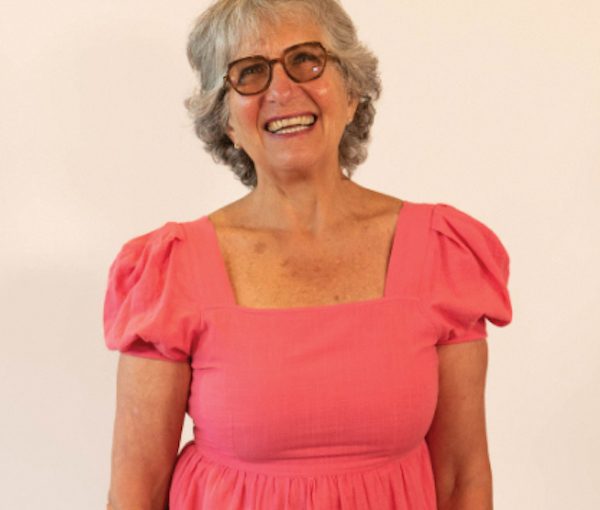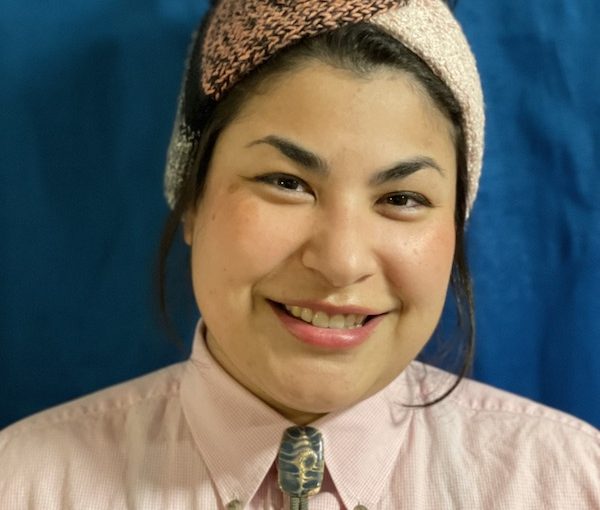Debbie Setton Tabenkin sees travel, genealogy and fun with grandkids in her future. (photo by Jocelyne Hallé)
Debbie Setton Tabenkin, one of the most familiar faces to anyone who has frequented the Jewish Community Centre of Greater Vancouver in the past three decades, is retiring at the end of January.
Tabenkin began teaching English as a second language at the JCC in 1995. In conjunction with that role, she was instrumental in creating the drop-in child-minding program for kids of parents using the centre’s facilities or attending programs. In the succeeding quarter-century, she has served in a variety of roles and retires as director of programming and strategic initiatives, where she oversees about 10 program areas and 12 budgets.
Tabenkin’s interesting family history plays a role in her approach to her work. Her parents’ lineage is from the Syrian and Turkish Jewish communities and, in the early part of the 20th century, parts of her family migrated to Jamaica and Panama. Because there was a polio pandemic in Jamaica when her mother was pregnant, they traveled to Panama, where Tabenkin (née Setton) was born, returning to Jamaica as a babe in arms.
“I was used to what the community centre meant in Latin America,” she said of her philosophy around the work she does. “It was a social place where you came and you met people.” The “living room” of the community, she calls it. That is what she believes she has helped foster in Vancouver.
But there was a winding road before she ended up here.
The Setton home in Jamaica was the holiday destination for any Jews who happened to be on the island, whether American Peace Corps volunteers or Israelis helping the nation with agricultural infrastructure.
When she was 16, the family left Jamaica, where violence was becoming frequent, and moved back to Panama.
Her grandfather owned the kosher supermarket in Panama City, where family members – she has about 100 first cousins – still operate it. The store moved into new digs that include a kosher sushi restaurant just two weeks ago.
She was the black sheep of the family, she cheerfully admits.
“I came from a very traditional family where the girls got married,” she said. “One [sister] got married at 19 and one got married at 17 – and I knew I wanted a different lifestyle.”
She did a two-year associate’s degree at the American college in the Canal Zone and then taught Grade 2. She wanted to further her education and her parents said she could either go to New York City, where a sister had moved, or to Vancouver, where her brother, Victor Setton, had settled in 1975.
She completed her bachelor of education at the University of British Columbia, but the federal government at the time did not have a program that allowed her brother to sponsor her to remain in the country. So, she returned to Panama and taught English at the Jewish day school, Instituto Alberto Einstein.
She decided to pursue a master’s degree and, in 1980, was accepted at both Columbia and New York University. She got her MA at Columbia in the then-new field of educational technology and media.
“I lived in New York for five years and, you know, everything is for a reason,” said Tabenkin. “I’m so happy the Canadian government didn’t take me because that gave me five years in New York and those five years made me the person I am.”
She drank in the cultural offerings of the city and became very involved with the Sephardi association there.
“I became very proud of being Sephardic,” she said. “I really learned the history of the rich culture that Sephardic Jews have. I took multiple classes. I accessed everything and that’s when I learned Hebrew.”
She returned again to Panama but, then aged 30, set her sights on a new conquest.
“I really wanted to have a child and I really wanted to get married,” she said. “I decided, OK, I’m going to go to Israel. My mother was delighted when I left to Israel.”
She had taken up scuba diving in Panama and poked her head into a scuba store in Tel Aviv looking for information about opportunities to pursue the sport. She chatted with a young man named Yair Tabenkin.
A few days later, a friend invited Debbie to tag along to a Purim party and a scuba expedition in Eilat being organized by a young man. When the friend described the pal who was planning the trip, Debbie replied, “I think I met him.”
When the mutual friend told Yair who she was bringing along, he said, “Oh, is that the girl with the beautiful blue eyes?”
“He remembered my eyes – and that was it,” she said. “The rest is history. We met that Purim and we got married in August.
“On the year anniversary that I had moved to Israel, I was married and pregnant,” she said. “Let’s put it this way: I accomplished my goal.”
Before that happened, there had been some snooping. Yair Tabenkin had some family in Panama and queried about the Setton family. A similar investigation was happening in reverse.
“My mother went to the rabbi and said, look, my daughter is dating this guy named Yair Tabenkin,” she said. “And the rabbi said ‘Tabenkin? It’s like marrying a Kennedy.’”
Yair’s grandfather, Yitzhak Tabenkin, was a founder of the kibbutz movement and a leading figure in the creation of Mapai, the precursor to the modern Labour Party, along with David Ben-Gurion and Berl Katznelson, and was a member of the first Knesset.
After Debbie and Yair married, they were speaking with Debbie’s brother in Vancouver, who said he had an opportunity for the new husband. The couple moved here in 1990.
Her responsibilities at the JCC expanded quickly from that first ESL gig. She began organizing events – something she had been doing since her teenage years, when she created a Purim party in Panama.
On New Year’s Eve 2003, Tabenkin organized a multi-generational event at the JCC, where kids were entertained by camp counselors in the gym and pool while parents dined and discoed before everyone came together at midnight.
In 2004, she began Festival Ha’Rikud, a celebration of Israeli culture through music, dance, food, art, workshops, literature, family activities and marketplace. This year saw the festival’s 18th iteration.
In 2008, she spearheaded the Israel at 60 festival in Stanley Park, one of the largest and most visible public celebrations in Jewish community memory.
As director of programming and strategic initiatives, she has a finger in pretty much every pie at the centre, but a particular point of pride is the inclusion department.
“Debbie’s had a very distinct impact on many people’s lives in the community,” said JCC executive director Eldad Goldfarb. “She’s a very caring person, both to her staff and team and to the members of the community, always trying to find what she likes to call the ‘magic moment,’ basically trying to find something good out of the bad and trying to solve problems and make people happy.”
Tabenkin holds a great deal of institutional memory not only of the JCC but of the entire community, Goldfarb added.
“She’s definitely someone whose big shoes are going to be difficult to fill,” he said. “She’s someone who’s got not just the history, but the personal connection to a lot of people in the community.”
In retirement, Tabenkin may do some consulting, spend more time with her three adult children and two grandchildren and she hopes to get back to some exotic adventures. Just before COVID, she returned from Ethiopia. Before that, she visited Uzbekistan. She wants to delve deeper into genealogy and would love to spend a month in Turkey investigating that branch of her family.
She looks back with more than fondness.
“I truly love this place,” she said. “My whole family has benefited so much. I always say a membership to the JCC buys you 15 extra years of your life. You’re keeping healthy, you’re working out, you’re with people, you’re not isolated. It’s truly a place where everyone can be together, it doesn’t matter what your socioeconomic background is, it doesn’t matter your religion. It’s a place where we all get to be together. It’s our living room.”


